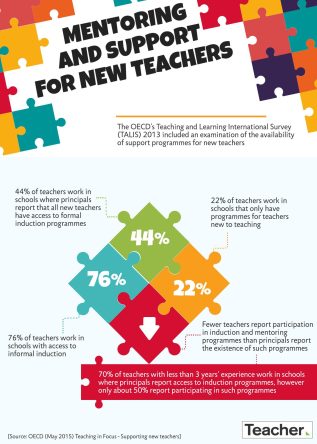At Kadina Memorial School, on South Australia's Yorke Peninsula, everyone going into a new role is given a mentor – from new graduates who are just joining the school, to experienced practitioners.
‘So, if it's your first time in leadership, your first time as deputy, your first time as head of school – whatever role it is,' Principal Dean Angus tells Teacher.
A consistent approach
Angus, who is currently on secondment to the state education department as a regional director, oversaw the amalgamation of Kadina's primary and high schools to form the R-12 school in 2012. He developed the mentoring program as a process for use throughout the new school.
Mentoring is part of the induction process for beginning teachers at Kadina. Angus says, given the research on teacher attrition (up to 50 per cent resign from teaching within the first five years), leaders need to give new starters in particular the ‘best shot' to stay in education.
‘It's all about sustainability, all about people coming into a site and understanding how this site works. The mentoring is not just about the bits and pieces of where the photocopier is, it's also about how we teach you, how we plan, how we collaborate, how we use student voice, how we look at developing metacognition … there's a whole range of things that we need to make sure, as a teacher coming in, they need to focus on.'
The process also includes a guide to setting up your classroom, negotiating the first week, and even the many education acronyms that are often taken for granted in the staffroom. ‘We assume so much. If you get a bushy-eyed teacher coming straight out of teachers' college, who has probably done a lot of prac but may have never ever set up a classroom before [or organised] the first week – now, that first week is absolutely crucial.'
Angus says, for all those moving into a new role, it's about helping them get into the role, making them aware of what they might need to do and ensuring the expertise is there when they have a question or need some guidance. That means committing to regular, co-constructed meetings – for new graduates the format is usually once a week at the start and gradually moving to fortnightly with the usual observations and collaboration in between.
‘For the heads in a leadership role, probably more on a fortnightly basis or longer depending on the position and how much support they need,' Angus explains. ‘It's not just ad-hoc, it's a time that's set aside for mentors to meet with their mentees.'
Teachers can also request an extension to the one year mentoring program, something Angus says a lot of staff choose to do as they like the relationships. His personal approach to leadership includes spending a day a week in classes observing teachers and participating in lessons. ‘Obviously you've got to look at what a principal's role is, and that's around not doing so much technical work and getting out there talking, being visible, being in classes and walking your school. It's how you structure your time. If it's important you'll create the time to do it.'
Supporting the mentors, not just the mentees
Rather than throwing staff in at the deep end unprepared, Angus says a critical aspect of the process is training the mentors – around two-thirds of his staff have been trained so far. ‘You might think that mentoring is easy to do, but no. We meet as a group of mentors and we train the mentors. We meet on a regular basis, some of it might be by email but we make sure we're constantly reviewing our program and speaking to them. We don't babysit them through it, we don't micromanage it, but we certainly train them to common areas.'
Recognising strengths
He's also keen to stress that a strong mentoring program is a ‘win-win' for all involved. ‘They all come in with their strengths. … by getting into classes and observing them and mentoring, we actually see what skills they've got – which we can then [spread out to others].'
Angus says he finds it interesting that John Hattie's research doesn't rate mentoring highly when it comes to its influence on student achievement. ‘I was a bit shocked by that because I just believe that it has made a big difference to our young pre-service teachers, and I know that because they tell me. And also the leaders, you know, their first role as a coordinator, it's different from when you're a teacher, it's another level so it's important that there's someone there that can help you through that, how you're working and so on.'
There are no plans to change the approach any time soon. ‘It's something that works for us and while people see it as a valuable thing we'll keep working on it.'
As a school leader, how are you supporting teachers who are newly qualified? What are the training needs of staff members chosen to mentor others?
Do you assess the success of mentoring relationships in your school?
As a graduate teacher, what additional information or support would you like to receive? Have you spoken about this with your mentor, a colleague, or member of the leadership team?



